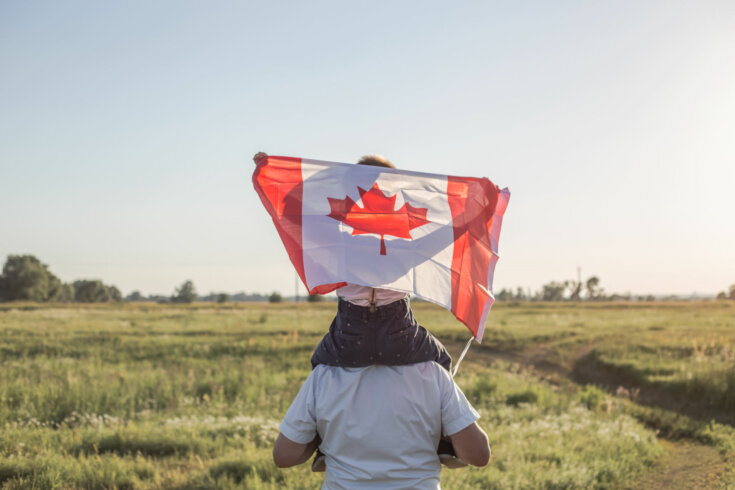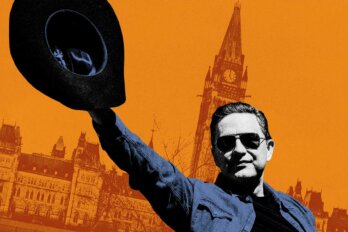I n my formative years, I was a nationalist in the make and mould of the Pierre Elliot Trudeau Liberals. Hey, I was a kid, alright? I was drawn to grand national narratives, the promise of a land that could do and be good, a place hewn from the toughest stuff—hard work, that is, but hewn nonetheless. It was like living in a Stan Rogers or Gordon Lightfoot song. Then I kept reading and listening—the history you don’t get in elementary or high school, or at least didn’t when I was growing up.
That was the history of violence and dispossession, of squatting on Indigenous land, of killing Chinese migrants to build the railroad that connected and made the country possible, of interning Japanese Canadians, of domestic mining companies off on heinous foreign misadventures, and more. Later, it was the history of retrenchment, of a social welfare state starved and neglected. I was disabused of a jejune nationalist commitment to Canada (call it pride or patriotism if you wish) and left with something rather colder and more distant—a view of the country seen as one might see data on a spreadsheet: this column is the good, that one the bad, the long one in the middle an in-between. Lots in that middle one.
US president Donald Trump’s economic war on Canada, declared by way of crushing tariffs and expanded with threats of annexation—at first a “joke,” now something closer to an explicit threat—is an assault on my country, on our country. Watching it unfold, my first reaction wasn’t one of dispassionate distance but something more visceral. I was angry and felt immediately drawn to the cause of unity—and retaliation. I’m not sure I’d call that a feeling of national pride, but it was one of resolve and solidarity, a feeling that there was indeed something good about this country, something worth preserving and protecting while remaining critical and, where necessary, even ashamed. It feels very much like familial love, really. There are few arrangements in the history of humankind that evoke deeper love and anger and hope and shame than relationships within one’s family. And no one likes it when someone tries to tell you and your family how to live.
Call me a nationalist then. I say I’m a reluctant nationalist, though, because I remain aware that the primary driving force of nationalism is visceral; it’s emotional. And while that’s powerful stuff, it’s the same substance that can distract you from the things you ought to be criticizing your country for, the things you ought to be fighting against. It’s all too easy to slip from “I love my country” to “Oh, let’s not talk about that. Too divisive, too nasty, not productive. We’re at economic war, after all!” It’s the same stuff that produces xenophobic and reactionary politics of exclusion along the lines of arbitrary markers: religion, ethnicity, language, culture. It’s the same stuff that makes us stupid and mean. No, that won’t do.
Today, Canada remains as deeply flawed as before in our relationship with Indigenous peoples, with our weak welfare state, with our corporate oligarchy, with our inadequate—increasingly so—plan to fight climate change, with so much more we ought to lament. But, by God, I care about the people who live here, and I believe this is a country worth fighting for against anyone who’d roll up and sock us in the kisser, goddamn them. I will still stand up for my country and our right to decide for ourselves how we want to live.
My reluctant nationalism is indeed driven in part by emotion, but there’s a rational bit to it. I believe there are good things about Canada and things that could be made much better. To repeat, that’s worth fighting for. Our socialized health care system is imperfect and at daily risk of being sold off to the highest bidder, but it wouldn’t be better if we became a full-on vassal state of the hegemon. It’s worth fighting for Canada’s health care system, not just in the face of Yankee threats but in the face of domestic actors who’d happily dismantle it for parts.
Canada’s national consensus on immigration is falling apart, again the work of cynical ghouls who’ve weaponized it for the market, but it, too, is worth fighting for. There’s no perfect multicultural paradise, and the myth of us as one has let us off the hook for major moral failures—such as our treatment of refugees from Syria or Gaza. But Canada has done better than many, and I’d like the work of shaping this country as a place for all sorts to continue. It beats a policy of racial nativism or, worse, revanchism.
Our flawed welfare state got better in the past decade. It’s nowhere near what it needs to be, but I want the work of building it to continue. That requires preserving the country in the first place, making it wealthier and more just in the process. I think that process ought to be driven by a democratization of workplaces and their control, with workers, rather than their bosses, receiving the fruits of their labour. But one precondition for such an economy is having an economy—and the sovereignty to direct as we see fit, which is the heart of the matter.
People here like to call Canada the best country in the world. I have no idea how you even determine that—flawed measurements from The Economist or polls in USA Today don’t do it for me, thanks—nor do I have any interest in running national Canada-Your-Utopia propaganda. But I will fight for Canada nonetheless.
My reluctant nationalism boils down to thinking there’s something good here that could be made much better. It’s driven by a desire to preserve our sovereignty so we can work out for ourselves how to do better and, in the process, to fight for those within our borders to be able to live how they wish to live. Last week, I signed the Pledge for Canada, which includes five principles for defending the country and puts things rather succinctly and nicely in the end: “Canadians will decide Canada’s future and place in the world.”
We must resist Trump’s attack. I will. I know I’ll do so with millions of others who join this national potluck with their own particular dishes in hand, their own varieties of nationalism, of patriotism, of whatever you wish to call it. In the end, we’ll be drawn together for many reasons and with many aims—some compatible, some not. We’ll fight the external threat and then we’ll sort out our own house on our own terms. That’s how it should be.
Now is a time to rally for this country. It’s time to fight to protect workers, and those who cannot work, from economic devastation. It’s time to fight to preserve a border that doesn’t exist for its own sake but for the purpose of delineating the boundaries of a way of living that we prefer, prefer to keep, and will fight for.
Adapted from “Confessions of a Reluctant Nationalist” by David Moscrop (Substack). Reprinted with permission of the author.
On Friday, April 25, join us for The Walrus Talks at Home: Tariffs. Four expert speakers will discuss what the U.S. tariffs on Canada mean, both now and in the future. Join us online. Register here.





